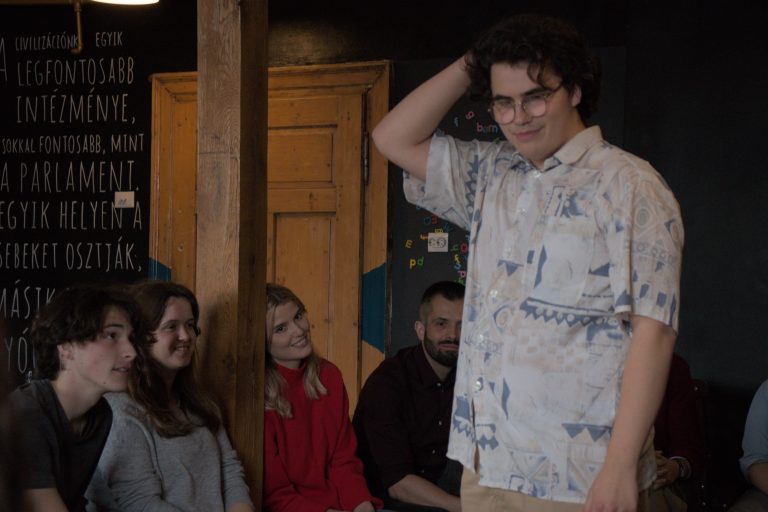Mietshäuser Syndikat is a rental housing network created in the 90s in Germany and its aim is to provide solidarity housing to its co-projects and its members. The need for creating this type of solidarity housing has its roots in the previous housing-movements which were trying to affirm that housing is a right for everyone, and on the other hand in the encounter with the constant expansion of the German housing market which lead to on-going dismantlement of safe and equitable housing conditions for renters. Solidarity housing according to the Syndikat’s model means that all its house-projects are free and able to own and manage their spaces. But while they are doing so, their houses can never end up on the housing market again, because the Syndikat can prevent this from happening, effectively contesting the commodity feature of a (rental) house and the unchecked way real estate companies are managing their housing “stock”. Within this framework the essence of rent also changes: while it stops contributing to the growth of the private wealth of a private owner, which – even when it comes to people’s homes – only follows its own private logic, and it becomes an investment into a common good by directing it towards maintenance and the creation of new housing-projects.
Máthé Péter – member of Social housing NOW! from Cluj, Romania – asked Lina Hurlin, housing activist, member of the Mietshäuser Syndikat Leipzig about the network’s history and present. The Romanian and Hungarian version of this interview was initially published in Cărămida’s/Tégla’s (the local publication on housing justice of Social housing NOW!) 11th issue.
Máthé Péter: Maybe we could begin with you mentioning a few things about yourself and your involvement with the Mietshäuser Syndikat.
Lina Hurlin: Mietshäuser Syndikat started in the 90s in the south of the country, in Freiburg, but back then I was not yet part of the network, because I was still a child. Our project joined the Syndikat in 2014. We found our house in 2013 and we joined in 2014. Now within its structure I offer guidance and consultancy in Leipzig and people living near and around this area. We also attend the meetings of the Syndicat on a national level.
Máthé Péter: How would you summarize the main idea of the Syndikat?
Lina Hurlin: The Mietshäuser Syndikat, that is, the members of the network all agree on the fact that people’s homes and houses are not for profit. The apartments and houses belong to those who dwell in them and they do not serve the purpose of anybody getting rich by them. To have a home is a basic human need, or a basic human right if you like, therefore it should not be used to generate profit. Basically, this is the main idea! And there is a growing need and interest for this idea, due to the fact that after the global economic crisis of 2008 the housing market exploded: private investors are buying up all the houses on the market. Gentrification is „the new thing”, mainly in cities. This means, spaces designed for living are losing ground to private investments while rental costs are constantly on the rise and less affordable. What the MS essentially does, it extracts houses from the market so it can offer protection against evictions or against other types of exclusion like gentrification which affects not only real estate but the use of (indoor and outdoor) public spaces too. Of course, MS can only offer protection to a small fraction of houses. It does not have the capacity to protect all tenants, nor to save the whole world. Right now, it has about 150 projects and a few thousand – if I’m not mistaken, 3000 – tenants who live in the houses of the Syndikat. But this is only a small portion of renters in Germany.
Máthé Péter: So, you see Mietshäuser Syndikat reather as one of many possible collective housing structures which together with other structures could provide housing for all?
Lina Hurlin: Yes. Of course, there are other models too that can work, for example the cooperatives. The way I see it, even if we won’t be able to convert all existing rental houses into collective or public property, the Syndikat confirmed so far that building and maintaining houses is possible without a rigid fixation on profits. Or that this whole process can be managed directly by us. Everything we do is based on self-organizing and self-administration: we buy and restore houses while throughout this process we demonstrate that housing can be guaranteed without the involvement of profit-grabbing investors.
Máthé Péter: Another thing which we are curious about the beginnings of the Syndikat: how did it start and where did it get its initial funding?
Lina Hurlin: Well, I wasn’t there when the project began, but I know that a lot of effort was put in finding a suitable legal form. The question was, what form the organization should take within the legal framework – which is different in every country – of capitalism in which we’re all living in. So, we ended up combining the GmbH (Gesellschaft mit beschränkter Haftung – limited liability company) and the association (Verein) through different types of agreements thus excluding the possibility of a house ever being sold. Essentially this model offers protection from re-privatization: the Mietshäuser Syndikat has shares in every single project’s or house’s GmbH and a veto say regarding the selling of a house, so it can always block or say no to any initiative aiming any selling. It is different in the case of a housing-cooperative (Genossenschaft), since the cooperative can decide by a majority vote to sell a house, but no such scenario can unfold within the Mietshäuser Syndikat.
About the intial financial means: Mietshäuser Syndikat mainly resorted to direct loans (Direktkredite) and secondly to bank loans for funding. I’m thinking it is the same in Romania when you – as an association or a limited liability company – are seeking for a bank loan you must have your own share. In Germany your own share must be around a third of the total sum. The sum of the down payment was raised through direct loans with the help and contribution of our friends, family members or persons who committed themselves to supporting a certain housing project. In the case of direct loans, a contract with or without a fixed term is signed. These direct or individual loans are of a great importance in the funding of the Mietshäuser Syndikat.
Máthé Péter: What is the exact structure of membership within the Syndikat?
Lina Hurlin: Every house project has a GmbH and an association. The two are linked to the Mietshäuser Syndikat’s association by a contract – the latter also has a GmbH. So there are two legal entities on one side, and two on the other. The membership of every house-association is made up of the tenants of the project. It is not easy to explain this in words, maybe our infofilm „Das ist unser Haus!” will help clear things up.
Máthé Péter: How does the financial management work? Do you have anyone employed?
Lina Hurlin: There is one person in Freiburg who is employed part-time, that person is the Syndikat’s accountant, but everything else is done on a voluntary basis. Our work is basically voluntary work.
Máthé Péter: Are you part of any housing network? Do you have any relations on a international scale?
Lina Hurlin: Sure, we even have an international work-group (Internationales) which focuses on supporting housing projects form abroad. This support is practically about analysing how the combination of the GmbH and the association could be applied in other legal contexts. Associations are slightly differently in every country; they function under different names and have different obligations. Our international work-group will present the Syndikat’s model in order to inspire other groups to organize in a similar manner. We have good relations with communities in Austria, Holland, the Czech Republic and a very good relation with projects from Barcelona, so, yes, we are in contact with a few groups. Among these groups the austrian habiTAT and the Vrijcoop from Holland bare the most resemblance with the Syndikat.
Máthé Péter: What can you tell us about your relationship with city councils? Is there any difference in their approach towards collective housing models if you are dealing with a smaller or a bigger city’s administration?
Lina Hurlin: Their approach varies from case to case. There are administrations which are constantly trying to obstruct our activity and there we have to put up a hard fight even for the smallest piece of public space. When we try to acquire public buildings, we’ll meet several kinds of reactions. For example, the administration of Tübingen is more open towards us, it even asked us a few times if we’re interested in this or that particular building. But there are cities were we mainly encounter hostile criticism – but these things have nothing to do with the size of the city, it is rather a question of being open to alternative ways of living. In Tübingen our relationship with the city is good because we have a long presence there and we have more houses.
Máthé Péter: Our next question is a technical one: how do you set your rental prices? We saw prices often differ from project to project.
Lina Hurlin: Yes, but the prices are not set by the Mietshäuser Syndikat, they are the result of an agreement reached by members of a project during their assembly. The members decide what kind of house do they want, how many would live in it, the quality of the maintenance and the restoration, how to solve the heating, what kind of windows they want or how much energy can they invest in all of this personally. There are houses where the future tenants life-style allows them to spend months on a construction site, while others cannot undertake such works so their house would cost more. But the most important factor regarding the costs of a house is its location. If a house is in the countryside of Saxony it will be cheap because the land and the construction firms are cheaper. But if it’s in the middle of München it will be costly. So, the price really depends on the buildings condition and location.
At the same time, it is of great importance for us to make our houses accessible for those who have a lower income or no income at all. For this we worked out a cross-financing (Querfinanzierung) method. This means that if the rent is a little bit higher compared to the sum an unemployed renter gets from the Jobcenter for his rent, than a few people, who earn well temporarily take over the payment of the rental deficit. This is one possible approach, surely more can be invented. It all depends on how much money does the Labour Office give to unemployed renters – so depending on the situation we’ll try to find a solution to help them through this period. And if the respective person does not find a job for a longer period of time, than we think of something else.
Máthé Péter: Do you have any workshops or anything of that kind in which activists from Romania could participate, if interested?
Lina Hurlin: Yes, the member’s assembly is an open event for everyone, but you have to announce your arrival in time, and you’ll have to get in touch with the organization. Or you could also meet our international work-group, this is also possible. So, besides the assembly of the members, the international working-group has separate meetings, they would be more than happy to have someone from Romania. And of course, we are also happy if there are people who wish to share the Syndikat’s experinece and model – and, surely, we also would be pleased to go abroad, to Romania if there is an event relating to housing!









